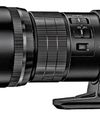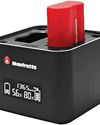
Typically, these subjects could be found in nature, such as flowers, butterflies, insects, or manmade objects like jewels, watches, small antiques, etc. Additionally, you can discover intricate details like patterns and textures, even within large objects. The genre of photography that deals with photographing small subjects has three categories: close-up photography, macro photography, and photomicrography.
So, what do these terms mean? The basis for this nomenclature is magnification, which can also be expressed as the reproduction ratio. Both of these indicate the ratio of the size of the image on the sensor to the size of the actual subject. If the image and the subject are the same size, then the reproduction ratio is 1:1, and the magnification is 1X. A reproduction ratio of 1:1 is also referred to as ‘life-size.’ If you photograph a subject, and it appears twice as large on the sensor, then we say the magnification is 2X, and the reproduction ratio, in this case, will be 2:1 (Picture 1).
Close-up photography refers to images taken at reproduction ratios of 1:20 (magnification of 1/20X) to 1:2 (½X). For macro photography, the corresponding figures are 1:2 to 25:1. Photography beyond 25:1 is referred to as photomicrography. Strangely, it is not called microphotography, which involves making very small images of large subjects by reduction. It is primarily used in industries, such as chip making, as the reduction process reduces errors. We will not be discussing both photomicrography and microphotography in this article.
How to Achieve Higher Magnification
This story is from the {{IssueName}} edition of {{MagazineName}}.
Start your 7-day Magzter GOLD free trial to access thousands of curated premium stories, and 9,000+ magazines and newspapers.
Already a subscriber ? Sign In
This story is from the {{IssueName}} edition of {{MagazineName}}.
Start your 7-day Magzter GOLD free trial to access thousands of curated premium stories, and 9,000+ magazines and newspapers.
Already a subscriber? Sign In

SELECTING THE RIGHT SYSTEM
Buying a new mirrorless camera can be a daunting decision. Not only are cameras very expensive, but also choosing a brand with an exclusive mount can mean locking yourself into a system.

Capturing Momenta Folding Boundaries
With the Pixel 9 Pro Fold, Google takes cues from its impressive line-up of Pixel smartphones and resolves some of the design oddities we’ve seen on foldable smartphones from more seasoned competitors in the category.

Super Sharp
Smart Photography reviewed the OM System OM 1 Mark II camera last month. If you haven’t read the review, please do so.

HIDDEN FEATURES OF YOUR CAMERA
Ashok Kandimalla has been in the photographic field for over three decades and has extensive experience in both film and digital photography.

Hahnemühle Hemp Paper at Olympics & Paralympics 2024
As the 2024 Paris Olympics and Paralympics embraced sustainability, Hahnemühle’s Digital FineArt Hemp paper played a central role as the exclusive medium for the official Premium Posters. This eco-friendly, plant-based paper aligned with the Games’ commitment to sustainability and delivered exceptional print quality. From limited-edition posters to the Artistic Posters Programme, Hahnemühle’s innovative use of hemp fibres showcased how high-value print products continue to thrive in a rapidly digitizing world.

The Lasting Power of Print: Preserving Memories Through Photobooks
I am a software engineer turned photographer, and my journey in photography has been a constant companion throughout my life.

The Wildlife of Eastern Mongolian Steppe
Mohit Ghatak is an engineer and a management postgraduate and works as a regional business leader in Singapore.

Abhishek Dey's Photo World
I identify myself more as a travel photographer than a purely landscape photographer.

Manfrotto lithium ion batteries for cameras
Manfrotto has introduced its new MKII lithium-ion batteries, featuring a higher capacity of 2400mAh for Nikon, Sony, Canon, Fuji, and OM System cameras.

Canon to have EOS C80 with enhanced features
Canon announced the launch of its latest Cinema EOS camera, the EOS C80, just ahead of the International Broadcasting Convention (IBC) 2024.